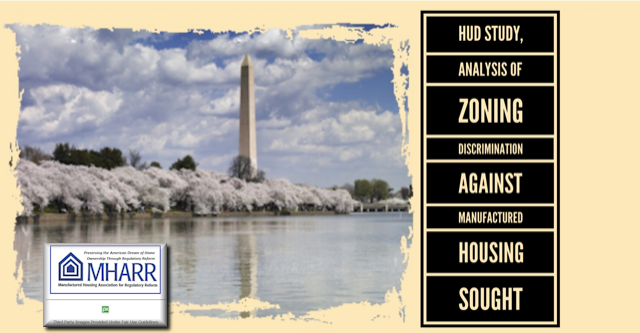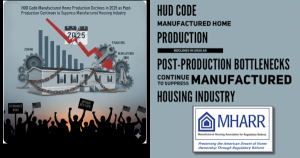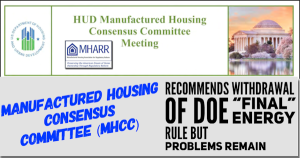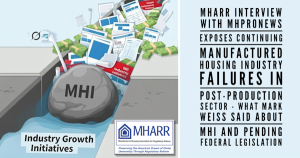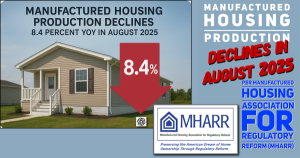[vc_row][vc_column][vc_column_text]MHARR SEEKS HUD STUDY AND ANALYSIS OF ZONING
DISCRIMINATION AGAINST MANUFACTURED HOUSING
Washington, D.C., April 8, 2019 – The Manufactured Housing Association for Regulatory Reform (MHARR), in an April 4, 2019 meeting with HUD policy, analysis and research officials, called on the Department to conduct nationwide research – and follow-up analysis – concerning local zoning mandates that discriminatorily exclude or drastically restrict the placement of federally-regulated manufactured homes to the detriment of lower and moderate-income American families in large areas of the country. The Association will also follow-up by communicating soon with Secretary Carson, directly, in order to advance this important activity.
This request to HUD, which is re-evaluating and updating its research activities in response to the recently-enacted “Evidence-Based Policymaking Act of 2019,” is consistent with and represents an initial step by MHARR to begin implementing the post-production-focused policies and priorities adopted by the MHARR Board of Directors at its March 27, 2019 meeting. As previously explained by the Association, this initiative commits MHARR “to take the lead within the industry to fully and completely implement … existing laws” in relation to “(1) exclusionary/discriminatory zoning mandates; (2) other placement restrictions or exclusions (principally relating to the development of manufactured housing communities); and (3) the availability of consumer financing.”
MHARR’s initial focus on discriminatory and exclusionary zoning moreover, is fully consistent with key HUD policy priorities as set out by Secretary Ben Carson, who stated in 2018 that HUD would act to “identify and incentivize the tearing down of local regulations that serve as impediments to the development of affordable housing stock,” including “restrictive or exclusionary zoning ordinances.” The applicability of this policy to HUD Code manufactured homes was confirmed by HUD in a subsequent 2018 publication, stating that “Zoning that excludes manufactured housing … contributes to affordability challenges, because manufactured housing potentially offers a more affordable alternative to traditionally-built housing without compromising building quality and safety.”
In Washington, D.C., MHARR President and CEO, Mark Weiss, stated: “It is unfortunate for both the manufactured housing industry and for American consumers of affordable housing that major problems affecting the industry’s post-production sector have been left to fester, unresolved, for years. MHARR has consistently warned that the absence of independent, national representation for the post-production sector would ultimately return to vex everysegment of the industry, as well as consumers, despite the fact that HUD Code manufacturers are building their best homes ever. Fortunately, as has happened twice before — with the enactment of the Manufactured Housing Improvement Act of 2000 and the Duty to Serve Underserved Markets — MHARR members have decided, once again, to take the lead to aggressively address these crucial pitfalls.”
The Manufactured Housing Association for Regulatory Reform is a Washington, D.C.-based national trade association representing the views and interests of independent producers of federally-regulated manufactured housing.[/vc_column_text][/vc_column][/vc_row]

